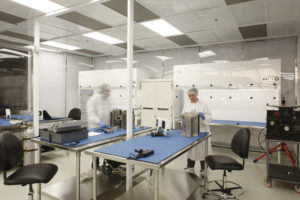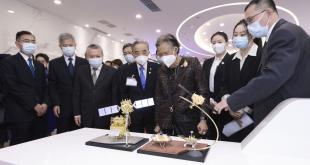
The Space Flight Laboratory (SFL) announced on May 16, 2017, the signing of a new contract to provide Dubai-based Mohammed Bin Rashid Space Centre (MBRSC) with a small microsatellite for aerosol and greenhouse gas monitoring. SFL’s Next-generation Earth Monitoring and Observation (NEMO) platform technology, which incorporates high performance ground target tracking capability, is a key enabler for the mission.
The DMSat-1 (also known as “AirWatch”) satellite will leverage past developments at SFL for a rapidly developed mission that will incorporate two payloads. The primary payload is a multispectral polarimeter used to monitor aerosols – fine particles of liquid and solids in the upper atmosphere normally caused by man-made sources, but also correlating to natural phenomena such as dust storms. The secondary instrument is a pair of spectrometers that will enable MBRSC to detect greenhouse gases like carbon dioxide and methane over the United Arab Emirates.
The study of aerosols and greenhouse gases will be conducted by researchers local to the UAE. “We are pleased that the Mohammed Bin Rashid Space Centre has selected SFL as their spacecraft provider for this important mission,” remarked Dr. Robert Zee, Director, SFL, “We look forward to fruitful collaboration with MBRSC and this exciting mission that will benefit the UAE for years to come.”
SFL builds big performance into smaller, lower cost satellites. Small satellites built by SFL consistently push the performance envelope and disrupt the traditional cost paradigm. Satellites are built with advanced power systems, stringent attitude control and high-volume data capacity that are striking relative to the budget. SFL arranges launches globally and maintains a mission control center accessing ground stations worldwide. The pioneering and barrier breaking work of SFL is a key enabler to tomorrow’s cost aggressive satellite constellations.
Original published at: https://spacewatch.global/2017/05/uaes-mbrsc-orders-environmental-monitoring-satellite-canadas-space-flight-laboratory/
 SpaceWatch.Global An independent perspective on space
SpaceWatch.Global An independent perspective on space

